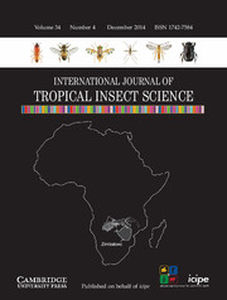Article contents
Studies on the legume pod-borer, Maruca testulalis Geyer—VII. Field surveys on pathogenic microorganisms
Published online by Cambridge University Press: 19 September 2011
Abstract
Field surveys along the Lake Basin and the Coastal regions of Kenya were carried out to assess the natural incidence of pathogenic microorganisms associated with the legume pod-borer, Maruca testulalis Geyer on the cowpea crop. A regular sampling regime was maintained on plots planted with four varieties of cowpea: T VX 66–2H, Vita 3 (TVU 1190), Ex-Luanda and Nyar-Milambo. Larvae of M. testulalis were recovered from the flowers and pods of the crop, and subjected to routine laboratory disease diagnosis including: tissue examination, culture incubation, microscopy and pathogen identification. The main groups of pathogenic microorganisms found to act as natural mortality factors to M. testulalis larvae include: protozoa, bacteria, fungi and a virus. A higher level of disease incidence and diversity on M. testulalis larvae occurred in the lake basin region of Kenya than the coastal part.
Keywords
- Type
- Research Articles
- Information
- International Journal of Tropical Insect Science , Volume 4 , Special Issue 1-2: Crop-Borers and Emerging Strategies for their Control , June 1983 , pp. 211 - 215
- Copyright
- Copyright © ICIPE 1983
References
REFERENCES
- 4
- Cited by


